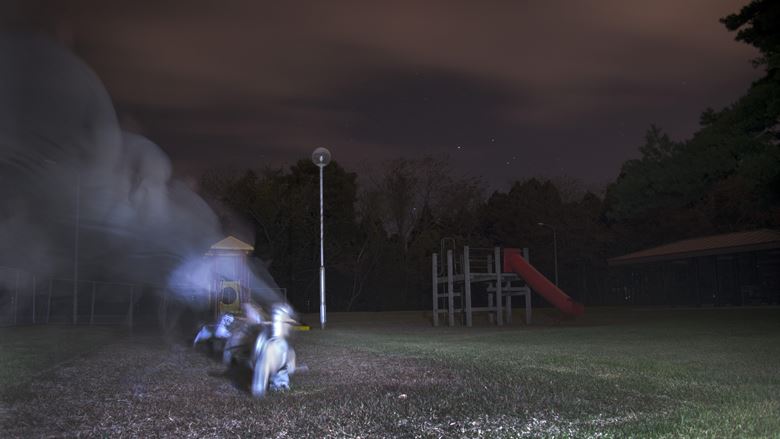According to the Oxford English Dictionary, haunt is defined as “frequenting, visitation by fears, suspicions, imaginary beings, spirits, etc.” According to Merriam-Webster Dictionary, haunt is defined as “to stay around or persist”. However, the best definition of haunt comes from dictionary.com, of which haunt is defined as, “to recur persistently to the consciousness of; remain with.” Considered together, these definitions suggest that being haunted involves a lesson or idea of which lingers until resolved or uncovered. In the literary works The Woman Warrior by Maxine Hong Kingston and Mean by Myriam Gurba, haunting describes lingering ghosts or stories used to teach lessons.
According to the Oxford English Dictionary, the word haunt does not have a clear origin: “it is unclear whether the earliest sense in French and English was to practise habitually, (an action etc.) or to frequent habitually (a place). The order here is therefore provisional.” In addition, according to Merriam-Webster, the word haunt comes from “the Middle English, from Anglo-French hanter, probably from Old Norse heimta to lead home, pull, claim, from heimr home.” According to etymonline.com, the definition “spirit that haunts a place, ghost” was first recorded in 1843, in stereotypical African-American vernacular. It has now been developed into a more frightful term, as the word haunt today is related to ghosts, ghouls, and being haunted by someone or something. The word haunt is also tied in with the idea of learning a lesson or taking something important out of the experience, thus the idea of being “haunted” by the things we do and the decisions we make.
The word Haunting is used to demonstrate people who hold an impact that follows one throughout their life. In texts such as The Woman Warrior and Mean, both speakers begin their own memoirs talking about another person’s story. Because these stories are reiterated throughout the memoirs, it shows how the authors have been impacted so heavily by these ghosts. In The Woman Warrior by Maxine Hong Kingston, the ghost that Kingston is haunted by is her lost aunt, who got pregnant at a young age, and passed away, and her family chose to leave her in the past and essentially forget about her, until Kingston’s mother told her story. In Mean by Myriam Gurba, she is haunted by the story of Sophia Torres, a girl who was raped and murdered at a young age, and the news article only described her as “transient”. These stories and ghosts haunt the authors because they are constantly reminded of them throughout their daily life.
In Maxine Hong Kingston’s The Woman Warrior, the word haunting is used to portray many life lessons. For example, in the first chapter “The No Name Woman,” Kingston speaks about how her aunt and her story of being shunned haunts her all the time. She states, “My aunt haunts me- her ghost drawn to me because now, after 50 years of neglect, I alone devote pages of paper to her,” (16). Because this story has been told to her by her mother, the ghost of her aunt now haunts her. The story of the no name aunt comes about when Kingston’s mother is trying to teach her about becoming a woman. This idea of a haunting emerges when Kingston’s mother states, “You must not tell anyone what I am about to tell you”(1). By telling Kingston this story, her mother is allowing the ghost of the no name aunt to emerge upon Kingston in order to teach her what not to do when becoming a woman. From telling her this story, this ghost of her no name aunt now lingers in the back of her mind, haunting her thoughts. She even writes the story down on paper for the world to read- something of which she was not supposed to do. By writing this down, she allows the ghost of her aunt to now haunt others, almost as if she is trying to bring justice to her aunt’s memory. This idea of being haunted by her aunt’s memory ties into the subtitle of the book: The Woman Warrior: Memoirs of a Girlhood Among Ghosts. This subtitle allows us to see into Kingsotn’s past, and how she grew up around the idea of ghosts and being haunted by stories in order to understand the world around her. Alongside this definition, Kingston’s memoir portrays how negative it can feel to be surrounded by ghosts. Kingston states, “ The Chinese are always very frightened of the drowned one, whose weeping ghost, wet hair hanging and skin bloated, waits silently by the water to pull down a substitute,” (16) which shows that the haunting lessons of these stories is what scared the Chinese the most. The Chinese feared these hauntings, as these stories were passed down to teach them the fear of what would happen if they disobeyed or did something their family or village did not approve of. Using the word haunt in two different contexts and connotations allows the reader to see how the word can be used to motivate people to learn about the past, and to teach lessons for the future as well.
In Myriam Gurba’s memoir Mean, she discusses her life, and stories that followed her throughout it. The first chapter “Wisdom” is the story of the brutal rape and murder of Sophia Torres. Since this novel is a memoir, it is strange that it opens with a story of someone else; however, in this chapter Gurba mentions that “Sophia is always with me. She haunts me. Guilt is a ghost.” (Gurba 3). Gurba opening her memoir with this story conveys to the reader how much the story of Sophia haunts her. The audience can continue to see this haunting throughout the novel. Gurba tells the audience about Ana Mendieta’s artwork, focusing on siluetas. Gurba wonders when she looks at the siluetas if “she was a psychic. I wonder if she made these for Sophia” (Gurba 116). This quotation allows the reader to see just how much she was thinking about Sophia, and how Sophia’s story haunts her. Gurba then repeats “Guilt is a ghost. Guilt is a ghost. Guilt is a ghost.” (Gurba 116). This phrase has already been mentioned, but in this chapter it she repeats it three times. The importance of this phrase is to convey how Gurba’s life is interrupted by painful memories, but not only her memories. Her life and stories are also haunted by Sophia’s story, and all other women who have faced this abuse.
Kingston uses the word haunt to give insight to the ways of the Chinese culture and how she learns to navigate life through stories passed down and the ghosts that linger from them and haunt her throughout her life. Gurba uses the word haunt in order to allow the reader to feel the weight of past stories and guilt on their shoulders; she allows them to feel and notice the lingering messages of her stories in the background. In today’s world, not many people believe in ghosts or the idea of hauntings. However, haunting is very prominent in literature, especially in these memoirs, as it allows us to see how past choices affect our future decisions. Both of these works of literature give insight to the versatile definitions of haunt and show the different aspects of which they affect people from, proving there is a deeper meaning to this word.
Works Cited
Gurba, Myriam. Mean. Coffee House Press, 2017.
“Haunt.” Dictionary.com, Dictionary.com, https://www.dictionary.com/browse/haunt
“Haunt.” Merriam-Webster, Merriam-Webster, 24 Nov. 2019,
https://www.merriam-webster.com/dictionary/haunt
“Haunt (v.).” Online Etymology Dictionary , Online Etymology Dictionary ,
Kingston, Maxine Hong. The Woman Warrior; Memoirs of a Girlhood Among Ghosts, Vintage International Edition, 1989.

